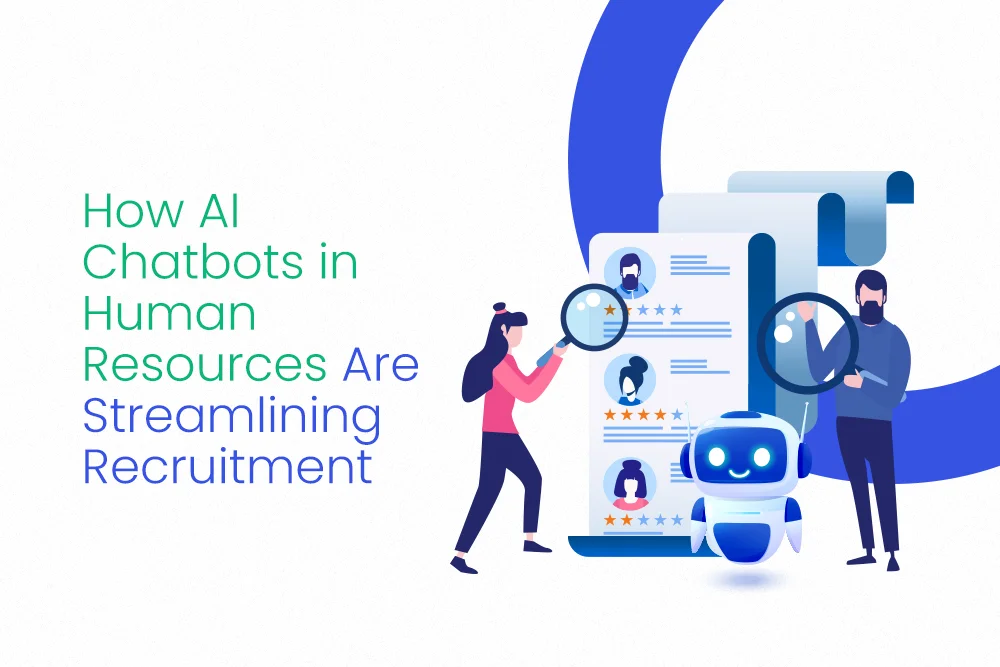The role of human resources (HR) is transforming, especially with advancing technology. A standout innovation in this domain is the integration of AI chatbots in human resources, a game changer that is revolutionizing the recruitment process. These AI-powered assistants are not just a trend but a fundamental shift in how companies attract, engage, and hire talent. This blog explores the impact of chatbots in human resources, focusing on their role in streamlining recruitment and providing an in-depth analysis of this technological advancement.
The Rise of Chatbots in Human Resources
HR chatbot platforms have gained significant traction in recent years, offering solutions to longstanding recruitment challenges. These digital assistants work around the clock, handling multiple tasks that traditionally require extensive human effort. From answering candidate queries to scheduling interviews, chatbots are enhancing the efficiency and effectiveness of recruitment processes.
Understanding HR Chatbot Platforms
At their core, HR chatbot platforms are sophisticated software programs designed to automate interactions with job applicants and employees. They use natural language processing (NLP) and machine learning algorithms to understand, learn, and respond to human input in a way that mimics human conversation. This capability allows them to handle various HR tasks, providing instant responses to queries, guiding applicants through the job application process, and even assisting with onboarding new hires.
The Benefits of Implementing Chatbots in Recruitment
Improved Candidate Experience
One of the most significant advantages of using chatbots in recruitment is enhancing the candidate experience. These AI-powered tools are available 24/7, ensuring that applicants can get answers to their questions at any time without waiting for office hours. This immediate engagement keeps candidates informed and engaged throughout the recruitment process, improving their overall experience and perception of the company.
Streamlined Screening and Scheduling
Chatbots can significantly reduce HR teams’ time screening applications and scheduling interviews. By automating these tasks, chatbots enable HR professionals to focus on more strategic aspects of their roles, such as building relationships with potential hires and improving workplace culture. This efficiency speeds up hiring and helps companies secure top talent before competitors.
Enhanced Communication and Engagement
With their ability to provide instant, consistent responses, chatbots are crucial in maintaining clear and continuous communication with candidates. This consistent engagement helps build a strong employer brand, attracting more applicants and improving retention rates among new hires.
Data-Driven Insights
Chatbots collect valuable data at every interaction, providing HR teams insights into candidate preferences, questions, and concerns. This data can be analyzed to improve recruitment, tailor communication strategies, and make informed decisions about future hiring needs.
Best Practices for Implementing HR Chatbots
Define Clear Objectives
Defining what you aim to achieve before integrating a chatbot into your recruitment process is crucial. Whether it’s reducing the time to hire, improving candidate engagement, or automating specific tasks, having clear objectives will guide the development and implementation of your chatbot.
Ensure a Human Touch
While chatbots can handle many tasks autonomously, the importance of human interaction in recruitment cannot be overstated. Design your chatbot workflow to identify moments when a human handoff is necessary, ensuring candidates feel valued and supported throughout their journey.
Keep It Simple
Implementing a chatbot aims to streamline the recruitment process, not complicate it. Ensure your chatbot’s interface is user-friendly and that its conversations are easy to understand. Avoid technical jargon and ensure the chatbot can guide candidates through the process in a conversational, engaging manner.
Continuously Improve
Leverage the data collected by your chatbot to refine and improve its performance continually. Regularly update its knowledge base and conversational abilities based on candidate feedback and evolving recruitment needs.
The Future of Chatbots in HR
As AI technology continues to evolve, the capabilities of chatbots in human resources are expected to expand significantly. Future advancements may include more personalized interactions based on candidate data, deeper integration with HR systems for seamless onboarding, and even predictive analytics to identify the best-fit candidates.
Expanding the Capabilities of HR Teams
Chatbots in human resources streamline recruitment and empower HR teams by expanding their capabilities. These digital assistants take on the repetitive, time-consuming tasks that often bog down HR professionals, freeing them to focus on more impactful activities like strategy development, employee engagement, and talent management. This shift in focus can lead to more innovative HR practices and a more dynamic workplace culture.
Personalization at Scale
One of the most promising aspects of chatbots in HR is their ability to personalize interactions at scale. Unlike traditional recruitment processes, which can feel impersonal due to the volume of applicants, chatbots can offer tailored guidance and responses to each candidate based on their queries and interactions. This level of personalization enhances the candidate’s journey, making them feel valued and understood from their first interaction with the company.
Reducing Bias in Recruitment
Another significant advantage of implementing chatbots in recruitment is the potential to reduce unconscious bias. By automating the initial stages of the recruitment process, chatbots ensure that candidates are evaluated based on their skills, experience, and qualifications rather than subjective criteria. This can create a more diverse and inclusive workforce, contributing to innovation, employee satisfaction, and business success.
Global Reach and Accessibility
Chatbots can communicate in multiple languages and are accessible to candidates from different geographical locations, expanding a company’s talent pool. This global reach is particularly beneficial for organizations attracting diverse talent or operating in multiple countries. Additionally, chatbots can be designed to be accessible to candidates with disabilities, ensuring an inclusive recruitment process.
Integrating with HR Technologies
The future of chatbots in human resources lies in their integration with other HR technologies. From applicant tracking systems (ATS) to employee engagement platforms, chatbots can serve as a bridge, facilitating seamless data flow and communication. This integration can enhance the overall efficiency of HR operations, from recruitment to onboarding and employee management.
Enhancing Employer Brand
Chatbots also play a crucial role in enhancing an employer’s brand. A responsive, efficient, and engaging recruitment process creates a positive first impression for candidates. This impression can be a deciding factor for top talents considering multiple offers. By demonstrating a commitment to innovation and candidate experience, companies can strengthen their employer brand and attract the best talents.
Challenges and Considerations
While the benefits are plentiful, integrating chatbots into HR also presents challenges. Concerns about data privacy, the impersonality of interactions, and the need for continuous updating and monitoring of AI systems are valid. Addressing these concerns requires a thoughtful approach to chatbot design, a clear communication strategy about their use, and ongoing efforts to balance automation with human touch.
Conclusion
Chatbots in human resources are a passing trend and a transformative tool reshaping the recruitment landscape. By streamlining processes, enhancing candidate experiences, and providing valuable insights, these AI-powered assistants are proving invaluable assets in the competitive world of talent acquisition. As we move forward, the role of chatbots in HR is poised to grow, offering even more innovative solutions to the challenges of recruiting in the digital age.




